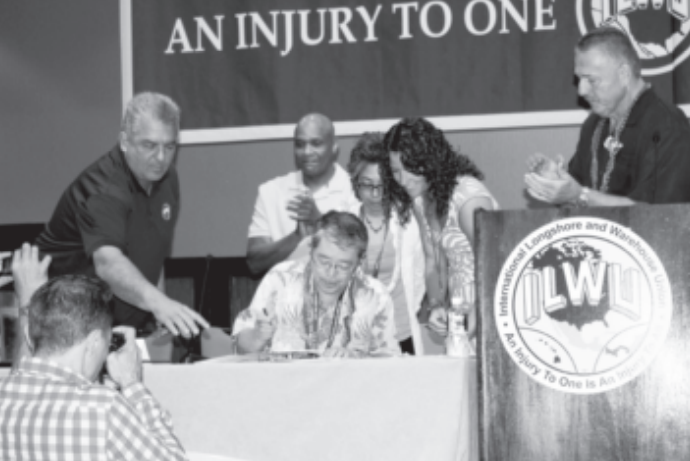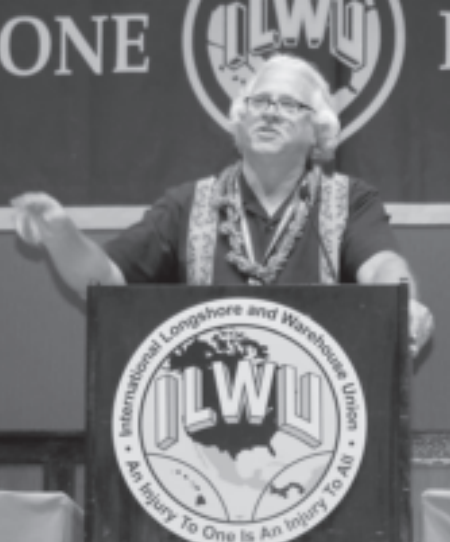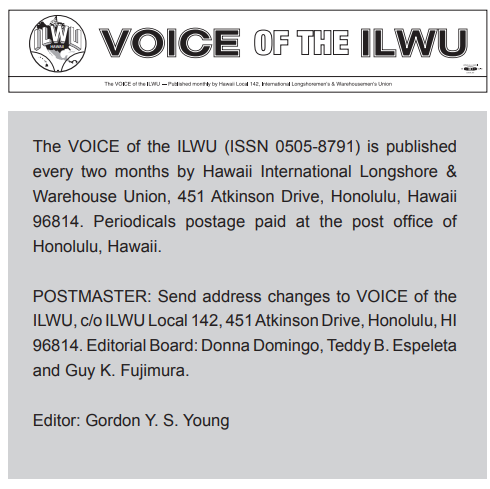President’s address
ILWU International President Robert McEllrath began by introducing his family and welcoming the delegates. Then he acknowledged the contributions of his fellow officers, Vice Presidents Ray Familathe and Wesley Furtado, Secretary-Treasurer Willie Adams, and Coast Committeemen Ray Ortiz, Jr., and Leal Sundet.
He then introduced a short video that covered the struggles of the ILWU for the past 8 years. After the video, he noted that the Union could not have endured the many challenges that we faced without the strong support from the rank-and-file members and dedicated Local officers.
He recalled the frustrations of dealing with other unions when ILWU members were locked-out by big grain companies in the Pacific Northwest. “It’s pretty hard to get a contract when other unions are walking through your picket lines,” he noted.
McEllrath said the decision to leave the AFL-CIO, was the correct one, but said ILWU locals can continue to remain active at the state and county levels of the AFL-CIO if they choose. He reminded the delegates, “We are out of the AFL-CIO, but not out of the labor movement.”
Anti-ILWU legislation
McEllrath then addressed the recently concluded longshore contract, noting that employers curtailed operation, then blamed the ILWU for the resulting congestion. The contract settlement doesn’t mean the struggle is over, he said, pointing to new legislation being introduced in Congress that aims to weaken longshore union bargaining power in future contracts. “They’re coming after us. You can’t stop work at the ports. They want to take away your power on the docks. But we are going to fight it.” The only way that we can win is to maintain membership unity and support from all union members. McEllrath continued, “We’ve all got to do our jobs, maintain our jurisdiction, fight the employers and outsmart them.”
Committee work
After the President’s speech, the Convention was recessed and the delegates headed to the committees they chose to serve on. The Resolutions and Constitution and Programs committees are where they hear and consider a wide variety of new policies and procedures.
In order to be considered for a vote by delegates on the convention floor, a proposed resolution or constitutional amendment must be introduced by a local’s delegation attending the convention and be submitted in a timely manner. In the committee meeting, each resolution is then fully explained, debated, and may be amended before it is presented on the convention floor. This required some committee meetings to go on late into the night. A total of 46 resolutions were heard in the committees with 39 going to the convention floor for further consideration by the body.
International solidarity
International solidarity was the theme repeated throughout the week. Speakers are listed chronologically when possible.
Chris Cain, Secretary of the Western Branch, Maritime Union of Australia (MUA), noted how the Western Branch’s membership grew from a 1,000 to 5,000 members recently and has been successful in getting more young members involved in leadership positions. As a result, the membership is more involved in the workplace struggles and doing more to hold politicians accountable. He talked about the struggles against Chevron and what they are calling “free trade”, but is more “exploitation of workers.” He encouraged the Convention to not only continue to organize, but to get active in the political arena.
Kozo Matsumoto, President of the All-Japan Dockworkers Union, Zenkowan, leads a militant, democratic, and progressive union that recently engaged in a series of oneday port strikes and provided critical support for ILWU Local 142 Pacific Beach Hotel workers in reaching their first contract settlement. President Matsumoto renewed the Solidarity Agreement by signing the “Friendship and Solidarity Statement” with ILWU President Robert McEllrath in front of delegates.
Stephen Cotton, General Secretary of the International Transport Workers Federation (ITF), a Global network of 700 unions in 150 different countries, outlined three key points: the importance of strong international relationships, the never ending changing face of transportation and what this means to workers, and the changes that labor unions are making to respond to these issues.
Paddy Crumlin, National Secretary for the Maritime Union of Australia (MUA) also serves as President of the International Transport Workers Federation (ITF). In Australia, the MUA is facing an anti-union government that has been waging war against workers. Rogue operators, including ICTSI, are investing in Australian ports. In the country’s Northwest, giant corporations including Chevron are exploiting the country’s resources, threatening to undermine worker standards, and suing MUA members for over $20 million dollars because of a safety dispute. Crumlin reflected on the history of the MUA and ILWU working together to build a union that is effective against the assaults on workers.

Zenkowan (All-Japan Dockworkers Union) President Kozo Matsumoto (sitting) signs a “Friendship and Solidarity Agreement” presented by Zenkowan to the ILWU. President Robert McEllrath also signed the agreement, which is a long-standing tradition reaffirming solidarity between the two unions.
Niek Stam, General Secretary of the Dutch dockworkers union (FVN) led a successful 7-year battle to recover pension funds that were stolen from workers through an insurance swindle. With help from the ILWU and other unions, the FVN was able to eventually recover $260 million that helped restore retirement plans for workers. Stam is also an expert about the impact of new technology on dockworkers because the ports in Holland employ some of the world’s most automated systems.
Britain’s Rail, Maritime & Transport Workers’ Union (RMT), assumed his post last year, following the untimely death of Bob Crow, the dynamic militant leader who died suddenly at the age of 52. Now Todd is leading efforts to help British union members in a challenging environment where anti-union politicians are increasingly common.

Guest speaker Paddy Crumlin, National Secretary for the Maritime Union of Australia (MUA).
Joe Fleetwood, General Secretary of the Maritime Union of New Zealand (MUNZ), recently helped the MUNZ membership overcome a bitter anti-union campaign in which the employers sought to “casualize” dockworkers by turning good union jobs into junk jobs. The ILWU and other unions mobilized quickly for solidarity rallies and marches, but the dispute was a 3.5 years struggle before an agreement was reached.
Marc Loridan, Federal Secretary for the Ports of Belgium Transport Workers Union (BTB), noted that the BTB faces the same challenges that we face in the U.S. from anti-union politicians who have pushed a pro-big business agenda that weaken unions, lower labor standards and give more power to management. In 2013, BTB workers went on strike for 6 days after employers tried to conceal the hiring of non-union, low-wage workers who were secretly performing union warehouse work near the docks.
Each of the special guests was presented with a bronze sculpture of an ILWU cargo hook, hand-crafted by Local 19 pensioner Ron Gustin. His work has been exhibited in galleries up and down the coast, and produced16 sculptures that were presented at the Convention, each requiring more than a dozen steps to complete.

